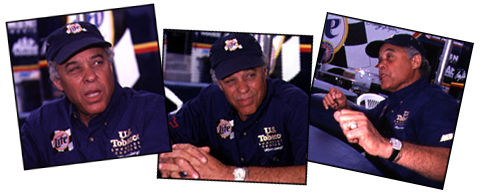|

DRO: Was it a case of just one morning in January 1994 saying, 'That's
it, I'm done' or had you been planning to go for some time as a driver?
DP: Well, you gotta keep in mind that in my career I ate, drank,
and slept drag racing. The most fun for me was like in the Army days
(1974-1980 Funny Cars). It was my car, I drove it, tuned it, and called
the shots and I really loved doing that. But then the sport changed.
More racers got sponsors, so if you owned a car, you had other jobs
other than just making the car win races. For instance, you got busy
enough to the point where you had to hire a crew chief. I didn't adapt
to that as well as Kenny (Bernstein) and (John) Force. I had more fun
calling the shots in the racing end of it, but I could see a lot of
changes coming down the road.
DRO: You're not saying that as far back as 20 years, you were thinking
about team ownership?
DP: Oh no, no, nothing like that. It's just that if I was going
to stay in this deal, I knew I was going to have to adapt to really
serve the sponsors, the guys who make it really happen. I always enjoyed
racing the car, but as the years went by I knew I couldn't go on forever.
DRO: In the time of the "Final Strike" tour, what was your thinking
about the future?
DP: Well, how can I say this? I was aging, and I just thought
I had had a great career as a driver and now it was time to think of
something else to stay in the sport. During the tour, U.S. Tobacco approached
me and offered me a great deal, something that normally doesn't happen.
They asked me if I'd like to be kept on the payroll for $100,000 a year
for five years and to put together a team. I asked my wife, Lynn, about
it and it took her about a second to say, 'Take it.' Up to that time,
I really didn't have a firm idea on what I was going to do or what would
happen to me.
DRO: We know that Wes Cerny and Larry Dixon Jr., were part of your
"Final Strike" team and were with you when you came back in 1995 as
an owner. How did you hold it all together?
DP: When we were getting toward the end of the year, I knew
for sure that once we got with U.S. Tobacco I wanted to keep Wes and
I told him that I was trying to put this really good deal together.
Basically while I was negotiating with Miller Beer at about the same
time, I told them that in two weeks I'd have to let my crew go; I couldn't
pay them. To shorten the story, they signed and I kept all my guys.
DRO: Including one who would become your Top Fuel driver, and a
later acquisition of your Funny Car driver?
DP: A lot has been said and written about our Top Fuel driver
Larry Dixon Jr. He was on our crew and I knew he really wanted to drive;
he'd said so quite a bit. We were at Gainesville Raceway and I decided
to put him in the car and see what he could do. He'd driven a little
before that and, knowing he wanted to drive, I coached him. He got through
the licensing procedure and then came out for a full pass and the kid
runs a 4.76! That was quicker than I had ever gone. I knew right there
I had my Top Fuel driver. I remember watching that run. When I saw the
time, I got on the mini-bike and charged down to congratulate him. Immediately,
I knew he could do the job.
I was still negotiating with Miller at the time he made that run and
when I saw it, I told them, 'I got this kid that will be dynamite and
to trust me on this one.' I bought him a suit and tie, even had to knot
the tie for him, you know young guys aren't really into stuff like that
all that much. Anyway, he's a good looking kid and he looked sharp and
he helped me land the deal.
Ron's the same way. He carried himself like a professional and he had
way more experience than Larry did. One year, he won an NHRA Top Fuel
race (the 1995 Northwest Nationals in Seattle) and when I found he was
available I snapped him up. Both guys look good in public, are sharp,
and they can drive.
DRO: What is the one biggest thing that you've learned in your years
as an owner?
DP: Absolutely, it's gotta be getting the right people in the
right situation, the right guy for the right job - and that's not all
that easy to do. Ask Kenny or Force, and I know they'll site that as
one of the big deals in their operations. It's not just a question of
this guy's a better crew chief or driver. You've got to consider things
like temperament, disposition, attitude, all kinds of stuff in putting
together a winning team. I changed a couple of crew chiefs in these
three years and they were excellent people, but there's so much to consider.
 |
page 2 of 3
|
|
|